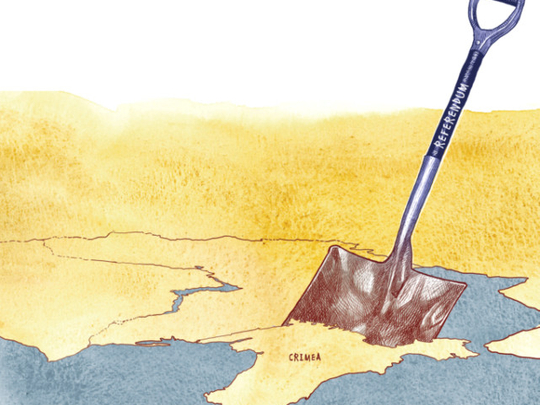
European nations adopted unprecedented sanctions on Russia last week. These are not designed to punish the Russian people. They are a warning to Russia’s leaders. For 20 years, Britain and our allies have gradually built a normal relationship with Russia. Russia joined the G8 and we have worked together on the UN Security Council.
But Russia’s actions in Ukraine hark back to a different era. The illegal annexation of Crimea is an outrageous land grab, and the referendum that preceded it a mockery of democracy. Russia has invaded a fellow European nation, and used force to change its borders. This is the most serious risk to European security we have seen so far in the 21st century.
Vital principles are at stake, including the territorial integrity of European nations and the right of democratic countries to choose their future. All nations, including Russia, depend on a rules-based international system. For those rules to remain credible there must be costs attached to breaking international agreements.
If we do not defend these principles in Ukraine, they will be threatened elsewhere. With thousands of Russian troops massed on Ukraine’s borders, there is a grave risk of the crisis deepening. That is why the EU, the US and our allies have imposed sanctions.
The European Commission is working now on more far-reaching economic measures to be imposed if Russia further undermines Ukraine. We want Russia to enter into direct talks with Ukraine, and to work with other nations to resolve this dispute peacefully. We have never given up on diplomacy or sought confrontation. But nor should European nations run scared before bullying behaviour.
Sadly, we and our allies must be prepared to contemplate a new state of relations with Russia that would involve Russia being outside some international organisations, facing lasting restrictions on military cooperation and arms sales, and having less influence over the rest of Europe.
Some in Russia may think that their actions in Crimea will produce short-term pain in the form of limited sanctions, after which matters will return to normal. In fact, the Russian people stand to lose a great deal over time. Russia’s actions have done immense damage to its reputation. At the Security Council last week, no other country voted with Russia, which was forced to use its veto alone.
Building energy security
The Russian government has alienated the great majority of Ukrainians. In Europe, ideas are now being discussed for how we build greater energy security. We should be prepared to diversify future sources of natural gas supplies to Europe, including through the Southern Corridor.
We would need to boost investment in gas interconnections and terminals in Europe, and develop indigenous European energy supplies such as shale gas. This would mean helping Ukraine and neighbouring countries to liberalise their energy markets and ensure more resilient supplies.
Russia’s actions in Ukraine should make it much more likely that the EU takes such decisions. Meanwhile, increasing our focus on supporting democracy in nations vulnerable to interference by Russia may be another part of the answer. Russia has been damaged by its oligarchic system. The same oligarchisation has damaged Ukraine: I have stressed to its leaders that tackling corruption, creating independent institutions and the rule of law are fundamental.
There is a danger of some of the same corrupting habits spreading into democratic countries. In south-east Europe and the Balkans, we see the creation of concentrations of power which could inhibit democracy. If this is not checked, European democracy could be undermined over the long term.
Supporting healthy democracy in such countries is now an additional strategic challenge for Europe. Britain, with our long history of democracy, has much to offer. Focusing on these two challenges would require a serious reappraisal of how Europe thinks about itself, and the readiness to change our relationship with Russia if that proves necessary.
Some in Russia may feel that their country has won at Europe’s expense. What they fail to see is that Russia loses even more than turning the Ukrainian people against Moscow. As things stand today, the arc of Russia’s path in world affairs risks once again bending towards isolation.
— The Telegraph Group Limited, London 2014
William Hague is Britain’s Secretary of State for Foreign Affairs.









